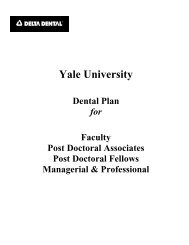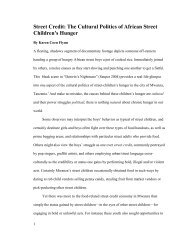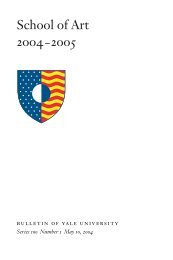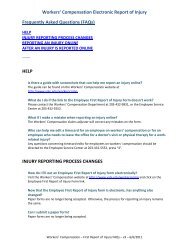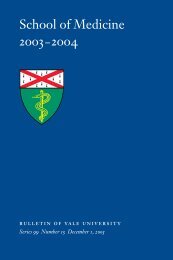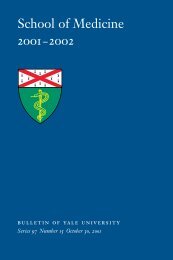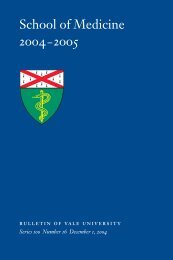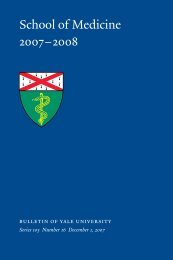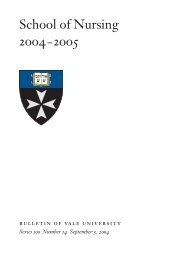bulletin 2002/nursing/pages.7 - Yale University
bulletin 2002/nursing/pages.7 - Yale University
bulletin 2002/nursing/pages.7 - Yale University
- No tags were found...
Create successful ePaper yourself
Turn your PDF publications into a flip-book with our unique Google optimized e-Paper software.
Doctor of Nursing Science Programaims and assumptionsRuth McCorkle, Chairperson,Doctoral Program, andDirector, Center for Excellencein Chronic Illness Care<strong>Yale</strong> <strong>University</strong>’s strength among doctoral programs in <strong>nursing</strong>is our focus on <strong>nursing</strong> practice. The experience gleanedfrom that focus has produced a solid foundation for scholarship.At <strong>Yale</strong> School of Nursing our scholarship has emphasizedthe interchange between practice and knowledge,based on the belief that theory develops from practice and,in turn, influences it. This belief is in contrast to the morecommon concept in <strong>nursing</strong> that a unidirectional relationshipexists, with theory driving practice. From the early1960s when the <strong>Yale</strong> School of Nursing faculty made a commitmentto clinical practice and clinical research, we havemade significant progress in support of these priorities.<strong>Yale</strong>’s commitment to the preparation of clinical scientists isreflected in its commitment to strong research preparationwithin a doctor of <strong>nursing</strong> science program.At the completion of the program, graduates are able todesign and conduct research relevant to <strong>nursing</strong> practice; extend the theoretical base of<strong>nursing</strong> by empirical investigation of <strong>nursing</strong> phenomena and developing theories; testconceptual models and theories that are derived from knowledge of <strong>nursing</strong> and relateddisciplines and have relevance to <strong>nursing</strong> practice; assume leadership roles in the <strong>nursing</strong>profession and health care system; and disseminate knowledge generated by independent,collaborative, and multidisciplinary research efforts.requirements for the degreeThe Doctor of Nursing Science degree requires at least four academic years and sixtycredit hours. The grading system includes Honors, High Pass, Pass, and Fail. The studentmust maintain a High Pass average in order to remain in good standing. If the average fallsbelow that in a given term, the student is placed on academic probation.Successful completion of three examinations is required. The Preliminary Examinationis scheduled after completion of the equivalent of the first year of course work(twenty-two credits). The focus of the examination is on the evolution of scientificknowledge, the transmission of knowledge, analysis of <strong>nursing</strong> concepts, research methods,statistics, and the <strong>nursing</strong> emphasis. The examination is given two weeks after theend of the spring term.The Qualifying Examination takes place at the end of the second or third year. The studentprepares a comprehensive proposal containing documentation on the bases for decisionsabout the conceptual framework, design, methods, and plan for statistical analysis forthe dissertation. This oral examination for candidacy involves a defense of the proposal, as




